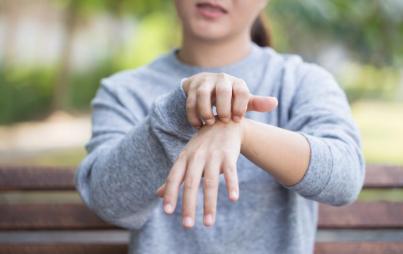
My wife is a gorgeous, brilliant, badass woman, a fact that’s clear to anyone who knows her and anyone who’s ever heard me talk about her. She’s also fat (in the interest of full disclosure, this column was written with her permission). This is a term both she and I use not as an insult, but as a neutral descriptor, and sometimes people are confused by that. For instance, over Christmas we stayed at my mom’s house. At one point, my wife referred to herself as “fat,” to which Ma immediately launched into a litany of “Aw, don’t say that”s and “You look fine”s, as though my wife had said something horribly insulting about herself. This made her distinctly uncomfortable, particularly since earlier during our visit, during a discussion of music, my mom had said, apropos of nothing, that Adele was inferior to Amy Winehouse because she was fat.

When you read these two moments side by side, it’s hard not to read the subtext: You’re not fat, because if you were, you’d be deserving of scorn.
This is all part of a broader phenomenon that I call the One of the Good Ones Effect. We hear a lot about how having a personal connection to a marginalized group may make you reevaluate your feelings, such as Ohio Republican Sen. Rob Portman declaring his support for marriage equality last year after his son came out, or a 2012 Reddit thread in which multiple posters admit that having daughters made them reevaluate misogynistic attitudes. But there’s another way this can go: some people just decide that individual experiences that don’t fit with their worldview don’t “count.”
In Spike Lee’s Do the Right Thing, the protagonist, Mookie, points out to Pino, the racist son of a pizzeria owner, that, even as he rails against “n—ers,” his favorite athlete is Magic Johnson and his favorite movie star is Eddie Murphy. “They’re different,” is Pino’s only justification.
Body positivity is a hot topic nowadays, in large part due to high-profile figures like Jennifer Lawrence and Lena Dunham speaking out on it. But unfortunately, even with these voices, we tend to be taking one step forward and two steps back. When Lawrence told Barbara Walters in December that “it should be illegal to call someone fat,” in context she clearly meant something closer to “It should be illegal to body-shame,” but she did it in a way that goes along with the prevailing narrative that “fat” is intrinsically negative (besides which, as blogger Jenny Trout observed, “a woman who looks like Jennifer Lawrence doesn't have to shop for her clothes in online stores because no physical storefronts carry her size.”)
Similarly, when Howard Stern mocked Dunham in 2013 as a “little fat chick who kind of looks like Jonah Hill” and compared watching her do nude scenes to being raped, Dunham called into an apologetic Stern’s show and defended herself as “not that fat” and “super thin for, like, Detroit.” This is even more unfortunate than Lawrence’s remarks because not only is Dunham treating “fat” as a negative, she’s also paying homage to its close cousin, the idea that there’s a cutoff point for body positivity (and adding creepy, racist undertones with the “Detroit” non sequitur).
People who look askance at Dunham and Lawrence often contrast them with Oscar nominee Gabourey Sidibe, of Precious and American Horror Story fame, who, unlike the two of them, is not only actually fat, but has gotten very few roles that could be played by someone who wasn’t fat
(or black, for that matter). Would Sidibe be as warmly embraced, they wonder, if she adopted Lawrence’s disdain for dieting or Dunham’s casual attitude about nudity? That’s why it was so refreshing to see Sidibe’s tweet after this year’s Golden Globes this week, “To people making mean comments about my GG pics, I mos def cried about it on that private jet on my way to my dream job last night. #JK,” go viral.
As someone who’s neither a woman nor fat, I’m far less qualified to be a standard-bearer for body positivity than Sidibe, Lawrence or Dunham. My advocacy comes not from personal experience, but from a belief that when you speak up for somebody you love, you accept their input on how best to do it, and that means spending more time listening and less time saying things like “You’re not fat, you’re beautiful,” as though they were mutually exclusive. As blogger Marianne Kirby puts it, “I really, truly am fat. Telling me I am not supposes that I haven’t noticed the size of my own ample ass. And if you truly believe that then you don’t think highly enough of me to be paying me any compliments anyway.”
This article first appeared in Quail Bell magazine's anthology: Issue 5 — The Social Issue. Snap up a copy right here. Illustrations by Monica Janelli







